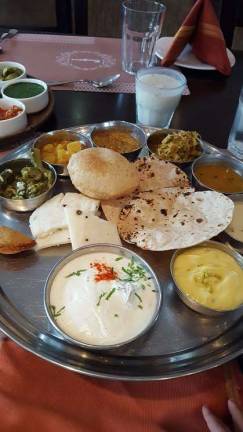Bread omelet? It means ‘welcome’

Last summer, I flew to India for one week. Four days in Mumbai and three in Chennai, India’s first and fourth largest cities respectively. Not long enough to explore the smallest corner of either—let alone the whole vast country.
The culture shock started before I left New York: I wasn’t allowed to wear shorts on the flight from JFK to King Abdulaziz International Airport in Jeddah, Saudi Arabia. Thankfully, I was able to change back into climate-appropriate attire upon touchdown in Chennai. I’m glad that Indians don’t share the Saudi phobia of men’s knees, or I would have suffered immediate dehydration from the legs.
Much of what I’d heard about India was true. Ubiquitous poverty, trains packed to bursting with sweaty men, no toilet paper, all spot-on. I was, however, struck by two elements not covered by the Western narrative: the food (my god) and the hospitality.
I knew I liked Indian food, but the real stuff was a whole different animal from the grimy curry houses I’m used to. In Chennai, the first city I visited, I was treated to two home-cooked meals by Iyyappan, an exceptionally sweet man who runs the Sri Arunodayam Charitable Trust for disabled orphans. The Trust owns several patches of land, one of which houses a garden where the abler children grow fruits and veggies as a form of occupational therapy. The lunches I ate with Iyyappan remain among the best of my life, and included curry made from fresh-picked carrots and lady finger, an Indian variety of okra. I pine daily for those meals.
In Mumbai, my host (Nillesh, a solar lighting distributor) was delighted to teach me to eat like an Indian, scolding me for not cleaning my plate and motoring us to a tiny street cart where a man was frying dough into perfect spheres and sandwiching them with a liberal dose of eye-watering spices between soft potato rolls. When we returned to his apartment and had poured ourselves some (really very good) Indian whiskey, Nillesh showed me how to press the roll so the fry ball flattened into a pancake and absorbed the chili sauces. I don’t know what this dish is called. Nillesh refused to name it, just calling it “street food.” At risk of repetition: my god.
All of this is food-as-hospitality, but I also experienced hospitality-as-food. My first non-commercial interaction with an Indian, after a long cab ride and a longer trek through mystifyingly-labeled streets, was with a woman named Vijayalakshmi. She was my Airbnb host in the Annanagar neighborhood of Chennai, and the first thing she did upon opening the door was hand me an ice-cold bottle of water. I thanked her profusely—it was much-needed—and she showed me to my room. I dropped my pack and turned to find somewhere to wash the dust off, and there she was, advancing on me with a plate of what she called, in broken English, “bread omelet.” (Bread omelet is an extremely spicy egg-and-pepper pancake accompanied by five slices of buttered white toast. It was delicious.)
I was treated to breakfast every morning and dinner every evening I stayed in Chennai. Neither Vijayalakshmi nor her husband spoke more than two sentences of English, but the warmth I felt needed no words. Nillesh spoke excellent English and was happy to teach me as much as I cared to learn about his city and his nation (at one point he told me I “think like an Indian,” which is among the best compliments I’ve received). Iyyappan seemed so genuinely happy to see me each time we met that, though I spent all of 20 hours at Sri Arunodayam, I consider him a close friend.
Of course I have experienced hospitality in America and elsewhere. Many times I’ve felt similarly welcome while crashing on a friend’s couch, staying at an Airbnb in a new city, or meeting a friend’s family. But never has it been so automatic, so much a part of the social fabric, as the generosity I found in India.
Western stories often use the trope of the holy man or supernatural being who knocks at doors disguised as an unwashed vagrant. The fate of the family within depends on their reaction: they are rewarded if they welcome him, punished if they turn him away. I don’t know if the Indian mythos has any such tales. But were I that kind of wanderer, everyone who opened their door to me would live happily ever after.